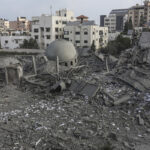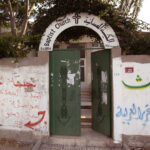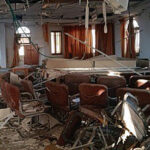JERUSALEM (BP)—Crucial humanitarian aid, the phased release of hostages in exchange for prisoners, and an end to Israel’s bombing of Gaza were among the terms of a ceasefire agreement announced Jan. 14 between Israel and Hamas.
Christian Mission to Gaza distributed food to 1,000 people in north Gaza and 800 in south Gaza Jan. 14, the same day the tentative ceasefire agreement was announced.

Survivors in Gaza, including perhaps 620 Christians, are desperate, anxious and hopeful for relief, said Hanna Massad, former pastor of Gaza Baptist Church and leader of Baptist Mission to Gaza, a gospel humanitarian outreach to the area.
“This agreement is very thin, and we hope and pray it will be implemented. Anything could happen, but this is why people are a bit nervous,” Massad told Baptist Press.
“People are really tired and exhausted in Gaza and they’re really desperate for this, and they hope it will continue—the agreement—and be implemented.”
Ric Worshill, executive director of the Southern Baptist Messianic Fellowship, discussed the agreement with skepticism he described as likely common among fellow Southern Baptist Messianic believers.
“It’s only as real as what Hamas does,” Worshill said of the ceasefire. “And it’s really not that good, because there’s like 93 or 94 actual hostages, and only 33 or so are being released? So there’s something wrong here and there’s more to it.
“If they (Hamas) were really going to be honest about what they’re doing, they would just release all the hostages. The sad part about is, for the few they’re going to release, they’re going to get about 100 terrorists back.”
Officials have said perhaps a third of the 100 or so hostages still held in Gaza are believed to be deceased, and Worshill pointed out Jews practice burial within a certain amount of time.
Sign up for our weekly edition and get all our headlines in your inbox on Thursdays
“They’ve held onto the bodies so that they would have leverage,” Worshill said of Hamas’ treatment of the deceased hostages.
“They know that in the Jewish faith, a dead person is supposed to be buried before the next Sabbath. So, they know that’s hurtful to the family.”
Israel continued to shell Gaza after the ceasefire was announced, with the Palestinian Health Ministry announcing about 80 deaths since the announcement, in addition to 46,500 since the war began.
U.S. Secretary of State Antony Blinken, in his farewell press conference Jan. 16, expressed confidence in the ceasefire agreement announced through mediators Qatar and the U.S.
Brent Leatherwood, Southern Baptist Ethics & Religious Liberty Commission president, did not comment on the ceasefire agreement, but stated stipulations he would like to see achieved.
“It is an outrage that nearly a year and a half after the October 7th (2023) atrocities, that there are still hostages being held by terrorists,” Leatherwood said in a comment submitted to Baptist Press Jan. 16. “As we’ve maintained throughout this moment, the hostages must be returned. Period.
“At the same time, Israel’s right to exist must not be threatened,” Leatherwood said. “I am praying for these objectives to be agreed to by all parties in the Middle East as quickly as possible.”
Agreement details
As announced in the multiphase ceasefire agreement to start Jan. 19—as reported by the Associated Press—in the first phase of 42 days:
- Hamas would release 33 hostages, including female civilians and soldiers, children and civilians over 50, beginning with three the first week, four hostages the next seven days, and weekly releases thereafter.
- In exchange, Israel would release 30 Palestinian prisoners for each civilian hostage and 50 for each female soldier.
- Fighting would stop, and Israeli forces move out of populated areas in Gaza, retreating to the edges of the Gaza Strip.
- Displaced Palestinians would begin returning home, and more humanitarian aid would be allowed to enter the strip.
Conflict’s effects on Gaza Christians
Gaza Baptist Church, the lone Protestant congregation that served residents of the Gaza Strip, was heavily damaged in the war and used as a military site for Hamas.
Massad pastored the church before founding Christian Mission to Gaza, which continues to provide food and other humanitarian aid to survivors still in Gaza, keeping the name of Gaza Baptist Church in the forefront.
“We look forward and we hope that both sides will implement this ceasefire and hopefully doors will be opened and we’re able to do more concerning relief and start to help more people rebuild their life,” he said, “not only with food and medical relief, but also with other necessities.”
At least 33 Christians have been killed in Gaza in the war, Open Doors U.S. said in supplemental materials released Jan. 15 with its 2025 World Watch List of the 50 worst places for Christians, although Israel and Gaza were not included on the list.
An estimated 800-1,000 Christians were in Gaza when the war began.
“In the time of war, there’s a number of people from the Christian community who have been killed,” Massad said, among them his aunt as well as a longtime member of Gaza Baptist Church, both elderly women.
“Civilians of course have been killed from the Christian community as well.
“We cannot really imagine the pain, the suffering, the fear,” he said. “The community continues to hold to their faith but really are waiting for this moment (of ceasefire).”
On the day the ceasefire was announced, Christian Mission to Gaza was busy serving food to nearly 2,000 survivors in Gaza, including 800 in the south and 1,000 in the north, Massad said.
“Our hearts are torn as we witness the innocent children, women and elderly suffering and being killed in this unimaginable tragedy in Gaza. Under such difficult weather and terrible circumstances, we are left asking what more we can do in the face of this nightmare” he shared in a ministry update.
“Yet, we continue to pray, trusting in the good Lord to bring peace and an end to this suffering.”
Subsequent phases of the ceasefire aimed at securing an end to the war, AP reported Jan. 14, would include the declaration of a “sustainable calm;” the release of the remaining male hostages in exchange for a yet-to-be-determined number of Palestinian prisoners and a full Israeli withdrawal from the Gaza Strip; the exchange of the bodies of deceased Israeli hostages for the bodies of deceased Palestinian fighters; the implementation of a reconstruction plan in Gaza and the reopening of border crossings in and out of Gaza.















We seek to connect God’s story and God’s people around the world. To learn more about God’s story, click here.
Send comments and feedback to Eric Black, our editor. For comments to be published, please specify “letter to the editor.” Maximum length for publication is 300 words.